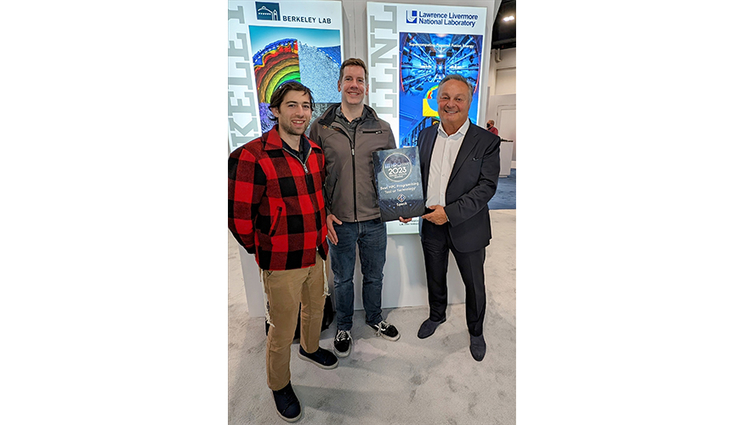Spack receives prestigious HPCwire award at SC23
 (Download Image)
(Download Image)
Spack developers and Lawrence Livermore National Laboratory computer scientists Greg Becker (left) and Todd Gamblin (center) are presented with HPCwire’s Editor's Choice Award for the Best High Performance Computing Programming Tool or Technology by Tabor Communications CEO Tom Tabor (right) on Nov. 15. (Photo courtesy: HPCwire)
Leading high performance computing publication HPCwire on Wednesday presented Spack developers with the Editor's Choice Award for Best High Performance Computing (HPC) Programming Tool or Technology at the 2023 International Conference for High Performance Computing, Networking, Storage and Analysis (SC23).
Spack, a versatile, ubiquitous and configurable package manager for HPC, was developed at Lawrence Livermore National Laboratory (LLNL) and has become a standard bearer in the community. Recognized as the official deployment tool for the Department of Energy’s (DOE) Exascale Computing Project, Spack has played a crucial role in running the world's first exascale machines at the Oak Ridge and Argonne national laboratories, and soon, the El Capitan exascale system at LLNL.
Spack has also partnered with companies like Hewlett Packard Enterprise (HPE) and become the package manager of choice for many international supercomputing centers. For Todd Gamblin, the LLNL computer scientist who created Spack in 2013, the open-source Spack community is just getting started.
“It’s great to get this recognition from HPCwire,” Gamblin said. “This project has been going for 10 years, and I think it’s become well-known among the developers in the HPC community. To support the diversity of use cases that we have, we have been trying hard to get some very complicated features into Spack to make it flexible, which will enable us to pursue more use cases and integrations with vendors.”
Gamblin noted the project's massive growth — which now includes more than 1,200 contributors from over 300 organizations — and said he hopes to grow Spack’s community even further with the High Performance Software Foundation (HPSF), a non-profit co-founded by Gamblin in conjunction with the Linux Foundation, which Gamblin announced before a large crowd at SC23’s DOE booth. HPSF is in the early formation stages, having found support from DOE laboratories, academia and industry, where it seeks to build, promote and advance a portable core software stack for HPC.
"We’re going to leverage and extend some of the continuous integration (CI) functionality we’ve built for Spack as a core service of the HPSF. This will help not just Spack but other HPC projects,” Gamblin said. “I think ultimately this will help us mature Spack as an integration tool and allow us to make the HPC developer experience more turnkey.”
One of the most downloaded products on LLNL’s Github page, Spack's capabilities include automating simulation and library installations; compatibility with various platforms like HPC, Linux macOS, and recently Windows; and integration with developer workflows. It excels in installing multiple versions of a build, accommodating different compilers, options, and Message Passing Interface (MPI) implementations — a need that is somewhat unique to the HPC community.
Core Spack developer and LLNL computer scientist Greg Becker said the team is looking to change the code for better modeling compilers, and in the long term, wants to add a model for ABI (application binary interface) compatibility to compose software stacks more easily from prebuilt binaries. Becker said he appreciates the positive reception of Spack within the community, emphasizing the satisfaction of seeing real-world users benefit from the tool.
"I think that's one of the nice things about these conferences, besides all the great technical interaction is to see people actually using it in the wild. Seeing the recognition from the community that it's working well and helping people is always a nice thing to see when I pick my head up out of the code for a week,” said Becker.
The Spack team includes computer scientists Peter Scheibel, Tammy Dahlgren, Richarda Butler and Alec Scott from LLNL, with many contributors from around the world, including Kitware, Inc. and core developers Massimiliano Culpo and Harmen Stoppels, who work remotely from Italy and Zurich, respectively.
In addition to the recent HPCwire award, Spack also received an R&D 100 award in 2019 in the Software/Services category and was recognized as an R&D Special Recognition medalist in the Market Disruptor–Services category.

 Jeremy Thomas
Jeremy Thomas






